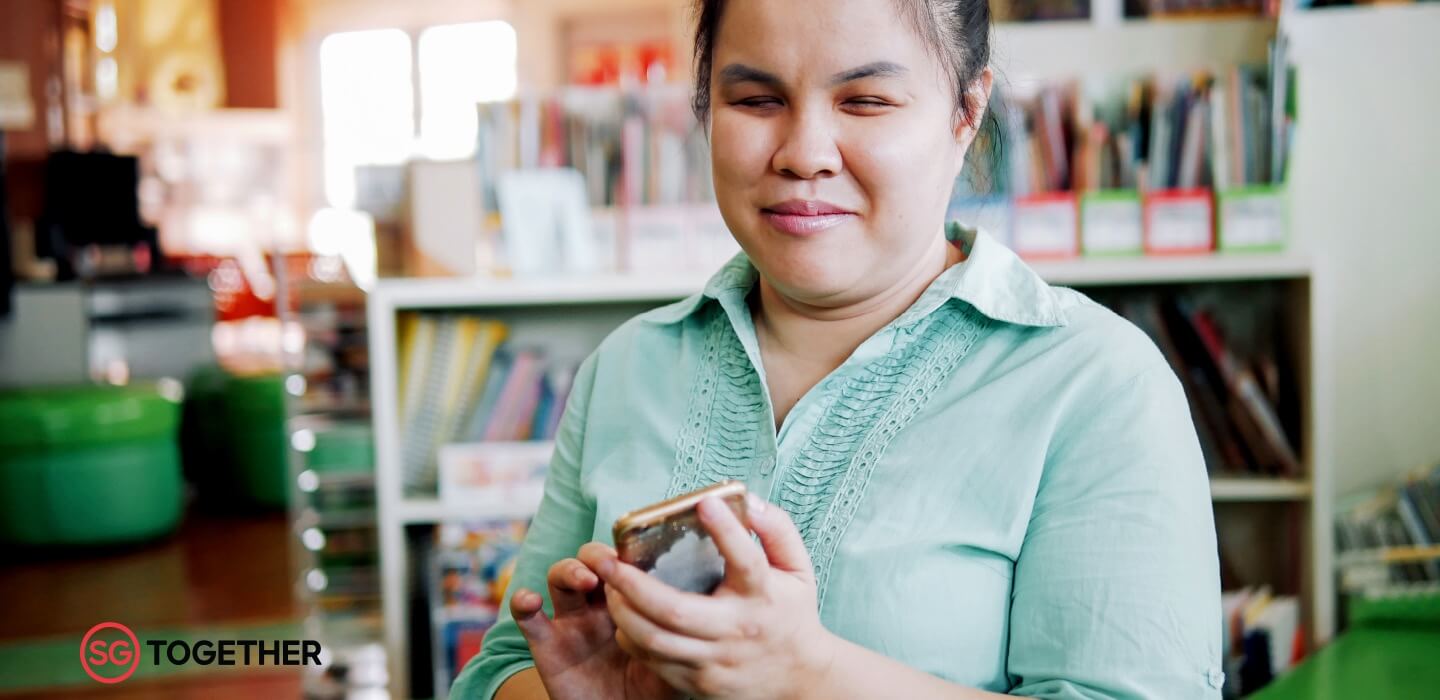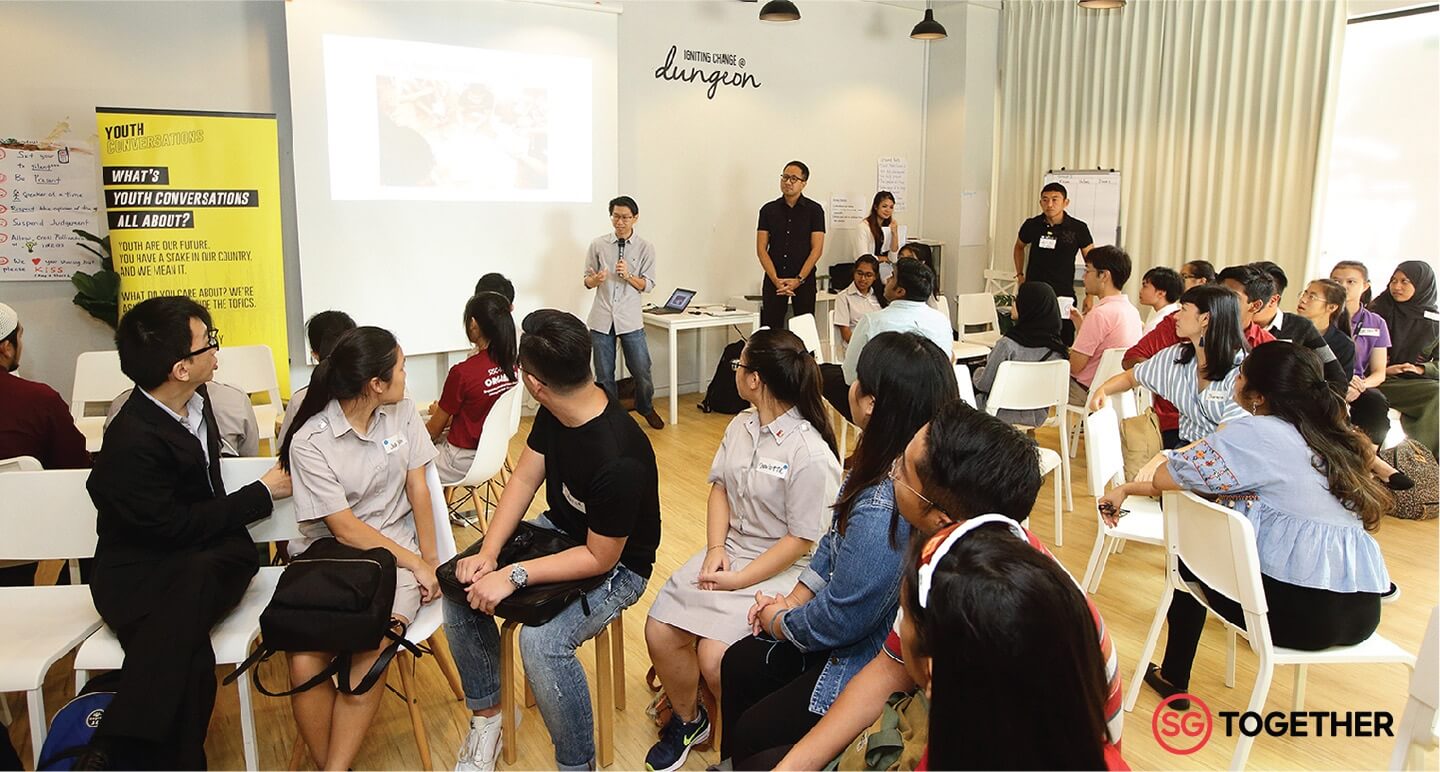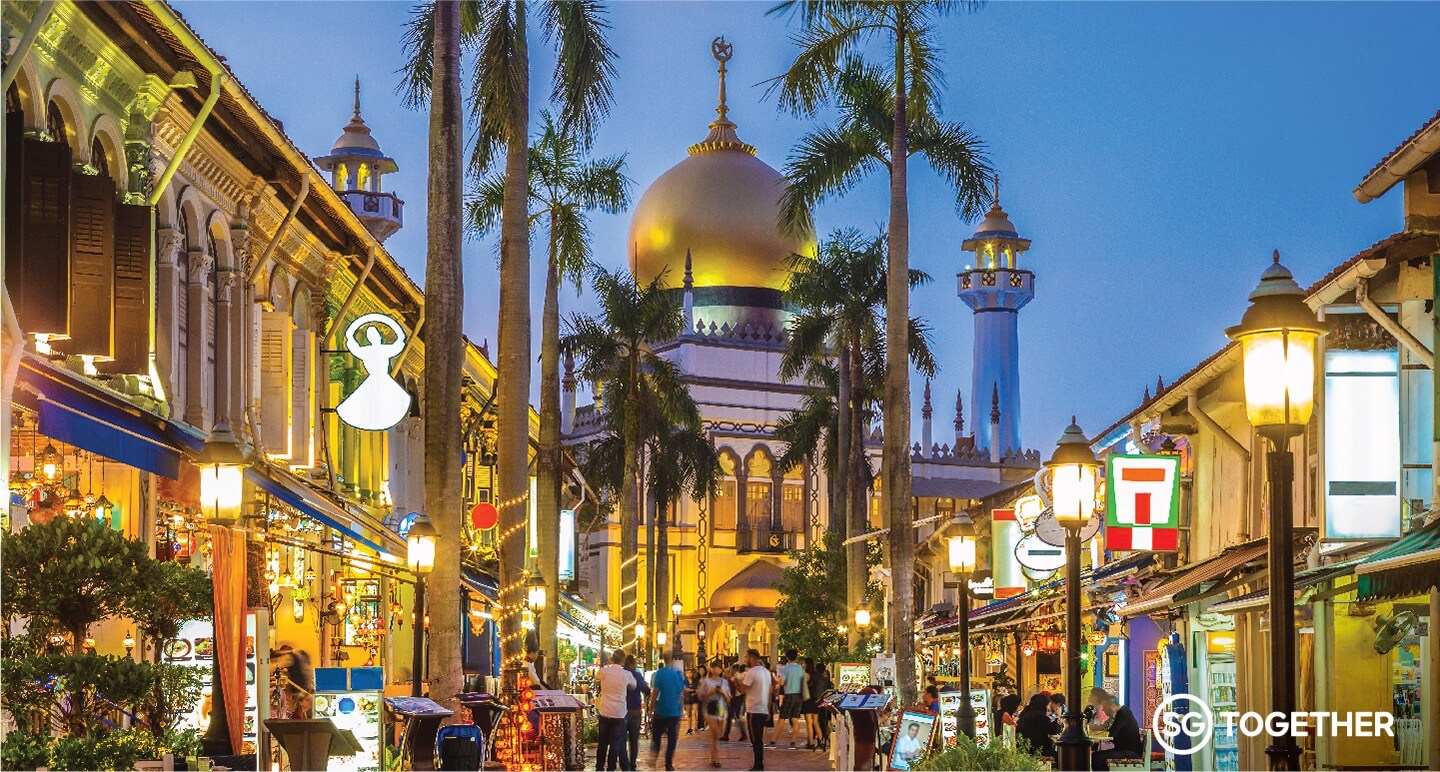On this page
Persons with Disabilities

The circuit breaker disrupted the routines of persons with disabilities (PwDs), and that of our caregivers and Social Service Agency (SSA) staff, as physical services had to be curtailed and engagement had to be shifted online suddenly. We found ourselves unable to attend rehab sessions and having to adjust to staying home.
We hope for greater awareness, understanding and inclusion of PwDs in the community and workplace. We hope that employers will be more open to hiring PwDs, and that supervisors and co-workers can be trained to interact with and support us at the workplace.
We hope for greater participation in society and integration in the community, by having an accessible built environment and transportation system. Apart from employment, we are concerned about the support available for children with disabilities after they exit the education system.
We also hope that there could be more lifelong training and learning opportunities. This would include better support for us to live independently, and exploring the availability of assisted living options for us in the community.
What’s Next
The Ministry of Social and Family Development (MSF) and partner agencies are committed to improving support for PwDs to prepare them for work and improve transitions for PwDs when they graduate from schools. MSF and partner agencies will enhance lifelong learning opportunities, create more job opportunities for PwDs and help them to better sustain these opportunities. MSF and partner agencies will also continue to improve access for PwDs to information and services, enhance access to assistive technology to support self-care at home and connection to the community, and raise awareness of the need for inclusion of PwDs through stepping up public education efforts. Collectively, these efforts will engender a more inclusive society.
Family Violence

The COVID-19 pandemic led to job or income losses for some of us, while others were feeling anxious about the future or trying to cope with the insecurity of the situation. If these stressors are not addressed, they could increase the risk of violence in the households.
We hope for greater awareness and understanding of family violence , and for all Singaporeans to stem family violence together. We hope more people will step forward to intervene or report acts of violence happening to their loved ones, friends or family. We agree that it is important to tackle family violence upstream – this includes finding out more about the impact of financial stresses, living environments and the ability of individuals to manage conflict.
What’s Next
The Ministry of Social and Family Development (MSF), Ministry of Home Affairs (MHA) and partner agencies work together to tackle family violence in Singapore. These include both upstream and downstream measures for both victims and perpetrators. Together, the community can work hand in hand with the Government to break the cycles of violence.
The Taskforce on Family Violence will consider the ideas/suggestions gathered at the ESCs, before it finalises its report in 2021.
Youth Mental Well-Being Network
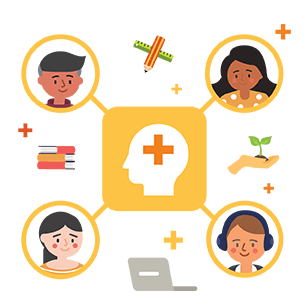
Against the backdrop of increasing mental health concerns among the young, more than 1,000 of us, from various backgrounds came together to generate and implement ideas to support youth mental well-being.
Over three Saturdays in October 2020, we shared our views on eight broad areas of interest and developed possible ideas to enhance youth mental well-being. The discussions ranged from enhancing youths’ emotional resilience to strengthening support among our peers, and within the family, workplace and community.
Throughout the different conversations, one key theme that emerged was the importance of whole-of-society efforts. From the October engagement sessions, we initiated ideas for about 40 potential projects with support from MOE, MSF and MOH.
What’s Next
The Youth Mental Well-being Network is an Alliance for Action, and members are currently developing these ideas into more concrete plans for implementation, with support from the Ministry of Education (MOE), Ministry of Health (MOH), and Ministry of Social and Family Development (MSF). If you are passionate to promote youth mental well-being and would like to join the efforts in carrying out the projects, connect with the network at: https://www.reach.gov.sg/youth-mental-well-being.
Youth Conversations

Between July to September 2020, 375 of us in 6 sessions shared our views and stories across 4 thematic areas: jobs and the future of work, support for vulnerable groups, mental wellbeing, and environment and sustainability. Some of us also shared our views via other channels such as online polls, videos, and articles that reached over 290,000 youths.
COVID-19 has had a deep impact on our youth. During the ESCs, we shared our hopes and dreams for Singapore in 2025, the values we want to see in society, and the issues we care deeply about. We also shared our concerns, and aspirations to tackle broader societal issues to emerge stronger together.
What’s Next
Ideas from the ESC have been channelled to the Youth Action Challenge (YAC), a developmental platform where youths identify problem statements and initiate solutions over a range of themes, with the support of government agencies, youth leaders and industry experts. The ESCs for Youth build on the National Youth Council’s past engagements on the needs and aspirations of youth for Singapore. Through the ESCs and the SG Youth Action Plan, the National Youth Council (NYC) has provided opportunities for youths to be heard, to be empowered, and to be the change.
More than 193 youths in 50 teams pitched their ideas in January 2021, across four themes: jobs and future of work, support for vulnerable groups, mental wellbeing, and environment and sustainability. Teams will receive funding support and have one year to implement their project ideas. Beyond the YAC, NYC also supports youths to take action through the Young Changemakers Grant.
Yellow Ribbon Singapore – Beyond Second Chances

COVID-19 disrupted our work and personal lives, and made more apparent the need for mental health, social and family support. We need to constantly adapt to keep up with the changes posed by COVID-19. At the same time, we also observe a deeper level of closeness and increased sense of empathy and unity among our colleagues, friends and family.
We hope that society could move beyond sympathy and towards dignity, to assist ex-offenders with the means to live a life like any other regular Singaporean. We also discussed the possible avenues for the community, including ex-offenders, to co-create a more inclusive and cohesive Singapore.
We want to encourage stronger support for giving second chances to ex-offenders and spreading this message more widely. At the same time, we hope that ex-offenders take ownership and be empowered to take charge of their own rehabilitation and eventually contribute back to the community.
What’s Next
Ideas suggested to strengthen throughcare and reintegration for offenders have been incorporated into the CARE Network's1 plans. Other ideas such as a career pathway for ex-offenders to enter the healthcare sector will be explored under the TAP and Grow2 initiative, where Yellow Ribbon Singapore (YRSG) teams up with industry partners like employers, trade associations and training institutions to establish skills and career progression pathways for offenders. Guided by YRSG’s Career and Skills Masterplans for the next 5 years, the TAP and Grow initiative has kicked off with the Precision Engineering and Media sectors. There are plans to expand this initiative for other growth sectors.
YRSG will continue to engage and inspire citizens to be advocates of second chances as part of the community action to empower ex-offenders’ reintegration and paying it forward.
1 CARE Network comprises nine agencies (MHA, MSF, SPS, YRSG, NCSS, ISCOS, SACA, SANA and YRF), and strives to coordinate and promote seamless throughcare support, from in-care to after-care, for ex-offenders.
2 Under the TAP and Grow initiative, offenders will undergo industry specific training to be equipped with nationally-accredited skills that are aligned with Singapore’s Skills Framework. YRSG will work closely with trade associations and employers to facilitate their recruitment into the relevant industries after their release, including options for traineeships or attachments. Like every Singaporean, these ex-offenders will be able to deepen their skills while building a career and participate in national-level initiatives to build a resilient workforce.
Facilitating the Relevance and Sustainability of Vibrant Precincts – Kampong Glam and Singapore River Stakeholders

Given the fall in the local office crowd and tourist numbers, we came together to reflect on how COVID-19 and pervasive working from home had adversely affected business in the Kampong Glam and Singapore River precincts.
The rich history and culture of a precinct are what makes it distinctive. We strongly desire to showcase these assets (e.g. the Singapore River waterfront and the rich heritage at Kampong Glam) to enhance the visitor experience. We also hope to introduce a wider range of offerings with a mix of new and traditional enterprises, to draw a more diverse crowd.
We see ourselves as the precincts’ ambassadors and are keen to continue leading collective efforts to make our precincts better. We see value in partnering to organise precinct marketing, heritage promotion, infrastructural enhancements, and creative programming with each other and agencies. While recognising the complexity of finding common ground between different parties, we believe it is necessary for better and more sustainable outcomes for all.
What’s Next
The Urban Redevelopment Authority (URA) will encourage more stakeholders to participate in placemaking efforts through the pilot Business Improvement District (BID) programme and existing business precinct partnerships. URA will continue to facilitate dialogue with different stakeholder groups to achieve collective vision and align stakeholders’ priorities for the precinct. URA will also partner and work with the community, in consultation with relevant agencies to support precinct initiatives, such as reviewing existing regulations to support heritage and new enterprises, as well as ideas to enhance the streetscape and overall connectivity in the precincts.
Digitalising the Real Estate Agency Industry

With restrictions on physical and onsite property transaction activities, all our fellow property agents had to quickly learn to conduct virtual meetings and online viewings with our clients, and facilitate transactions with electronic signatures. While some older agents who are not so tech-savvy encountered difficulties, we also saw opportunities to transform the industry arising from the pandemic.
We hope that digital transformation will be inclusive with sufficient resource support for smaller property agencies, and digital literacy training for the less tech-savvy agents so that they will not be left behind. We hope that property agencies can also ensure that their agents are aware of the benefits of digitalisation for property transaction activities.
We also hope for more training courses on digital literacy and marketing, and for digital platforms which can assist with various services such as compliance-related requirements, which would free up time so that we can focus on delivering value-added services to clients. As not all property agencies can afford to build their own platforms, a centralised system accessible to all would help smaller agencies.
What’s Next
The Council for Estate Agencies (CEA) will work with course providers to develop more digital courses to meet varying needs of property agents of different age groups. CEA will assist property agencies to seek government grants for investment in digital solutions and will work with the industry to facilitate the development of centralised digital platforms where relevant and appropriate. CEA will also showcase property agencies with positive digitalisation experience to encourage the rest of the industry to embrace technology in property transactions.
Transport Workers and Operators
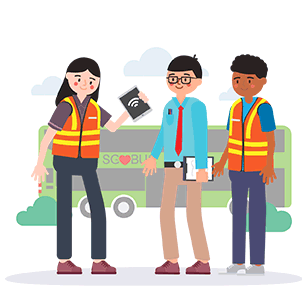
We are heartened that public transport companies have shown care towards us. We were provided with masks, hand sanitisers, and vitamins, and accommodation arrangements were made for the Malaysian bus captains. We also appreciate that our companies shifted processes from hardcopies to online platforms, and implemented more digital technology, which made processes more efficient for us and our fellow transport workers.
We hope to better understand the impact of future transport technologies on us. We also hope that education institutions could develop more apprenticeship programmes to give students further exposure to the public transport sector.
For those of us who are point-to-point transport drivers, we hope to have more support to tide over this difficult period. We are worried as incomes have fallen due to the sharp fall in tourism and as more people work from home. We hope for relief measures to be extended.
What’s Next
Following the ESCs with workers and operators in the transport industry from August to November 2020, the insights were taken into consideration. For example, the relief measures for point-to-point transport drivers were extended. The Ministry of Transport (MOT) and the Land Transport Authority (LTA) will continue to engage stakeholders regularly, to gather feedback and suggestions.
Legal Industry Transformation

We recognise that the legal landscape is constantly evolving. COVID-19 has brought about challenges in our daily business and studies. We hope that we will be able to adapt and respond to changing demands quickly, by calibrating our expectations and mindsets, and equipping ourselves with relevant skillsets through continuing professional development courses. Most of us who had adopted some form of digitalisation were able to adapt quickly.
We hope to see greater technology adoption, development and advancement within the legal sector. We also hope to internationalise, capitalising on the industry’s strengths in growth areas such as international dispute resolution, restructuring and insolvency, as well as expanding into emerging markets.
What’s Next
Following the Legal industry ESC involving broad representation from practising lawyers, industry association representatives, academics and law students, the Ministry of Law (MinLaw) has been looking into the suggestions raised, including supporting the legal sector in their technology advancement, internationalisation, and capability development. MinLaw will continue to engage stakeholders regularly, to further develop these ideas. Two of the upcoming areas that MinLaw will be engaging stakeholders on are in relation to the design of a legal tech platform for the legal industry, and legal education needs.

